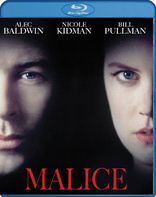Malice Blu-ray Movie
HomeMalice Blu-ray Movie 
Kino Lorber | 1993 | 107 min | Rated R | Jun 16, 2015Movie rating
6.4 | / 10 |
Blu-ray rating
| Users | 4.0 | |
| Reviewer | 3.5 | |
| Overall | 3.7 |
Overview
Malice (1993)
A college dean and a hospital volunteer are newlyweds restoring their beautiful house in New England. Their quiet lives are disrupted when they take in a mysterious lodger in the shape of a charismatic surgeon.
Starring: Alec Baldwin, Nicole Kidman, Bill Pullman, Bebe Neuwirth, George C. ScottDirector: Harold Becker
| Film-Noir | Uncertain |
| Thriller | Uncertain |
| Crime | Uncertain |
| Mystery | Uncertain |
Specifications
Video
Video codec: MPEG-4 AVC
Video resolution: 1080p
Aspect ratio: 1.84:1
Original aspect ratio: 1.85:1
Audio
English: DTS-HD Master Audio 2.0
Subtitles
English SDH
Discs
25GB Blu-ray Disc
Single disc (1 BD)
Playback
Region A (C untested)
Review
Rating summary
| Movie | 4.0 | |
| Video | 4.0 | |
| Audio | 4.0 | |
| Extras | 0.5 | |
| Overall | 3.5 |
Malice Blu-ray Movie Review
Don't Look Now, But . . .
Reviewed by Michael Reuben June 16, 2015Malice is a film so thoroughly built on deception and misdirection that even its fans accuse it of cheating. The thriller performed well upon its initial release in 1993 and received some favorable reviews, but no one found it credible. The plot was overstuffed, and the characters' motivations, once you reached the end, were baffling. Who actually behaved that way? But as I've rewatched Malice over the years, I've gained a greater appreciation for the care with which director Harold Becker (Sea of Love) and screenwriters Aaron Sorkin (The Social Network) and Scott Frank (Minority Report , Get Shorty) orchestrated Malice's string of lurid twists so that they all eventually link up, just not in any way you would have expected. As for motivations, the older I get, the more I find myself willing to believe that people are capable of anything. Malice does strain credulity but only in the way that most films do, which is that complicated schemes rarely play out as their makers intend. Or to quote arch-villain Vilos Cohaagen from the original Total Recall: "Frankly, I'm amazed it worked!" Malice benefitted from a lucky combination of talent both in front of and behind the camera. Besides its director and writers, it had the elegant lighting of the late Gordon Willis, whose photographic style transformed American cinematography from the Seventies forward in both thrillers and other genres (including All the Presidents' Men, which Willis lit like a thriller). The music was composed by the late Jerry Goldsmith, in whose score you can sometimes hear echoes of his previous year's work on Basic Instinct. The cast featured Nicole Kidman, then best known as Mrs. Tom Cruise, and rising star Alec Baldwin, the latter playing a character so reptilian and mysterious that the early promotional campaign simply featured his "God" monologue and nothing else. Little more was needed to pique viewers' curiosity than the sight of a coiled and confident Baldwin proclaiming: "Let me tell you something: I am God." Although Castle Rock Entertainment and New Line Cinema produced Malice, the initial theatrical and home video releases were handled by Columbia Pictures. By the time of the 2000 DVD, the rights had shifted to MGM, which has now licensed them to Kino Lorber for its "studio classics" Blu-ray line.
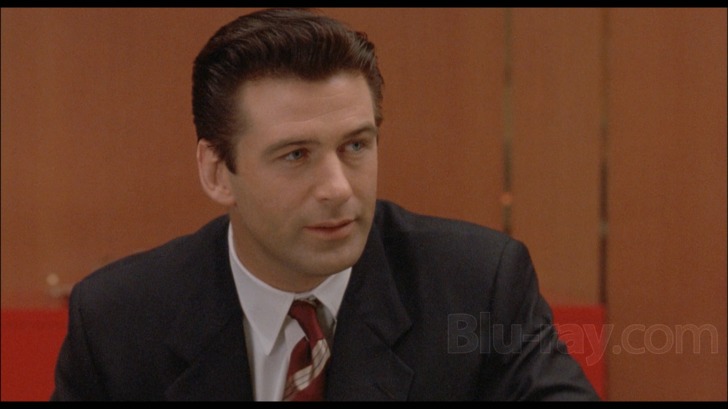
Andy Safian (Bill Pullman) is the Associate Dean of Students at a small women's college in a Massachusetts town that resembles Northampton, home of Smith College, where Malice was filmed (but was prohibited from using the school's name). He and his wife, Tracy (Kidman), have purchased and are living in a crumbling Victorian mansion that they are slowly restoring, but Andy's meager salary won't even pay for the plumbing work. To raise money, the Safians reluctantly decide to rent the third floor to a tenant, and just as they do so, Andy encounters a high school classmate, Dr. Jed Hill (Baldwin), a hotshot surgeon recently relocated to the area, where he is already impressing and intimidating his new colleagues at the local hospital. Tracy doesn't care for Jed, but Andy offers him the lease. The circumstances under which Andy encounters his former classmate are not happy ones. The college has been living under the threat of a violent serial rapist, who attacks students in their off-campus residences when they return from class. Dr. Jed is on call when the fifth victim is brought into the emergency room with life-threatening injuries, and it is his surgical skill that saves her. Andy's concern for his students, who are leaving the school in droves, and his frustration with the inability of the local police, led by Det. Dana Harris (Bebe Neuwirth), to develop any solid leads, have left him frustrated and short-tempered. Jed Hill's tenancy with the Safians quickly irritates Tracy, as the charismatic doctor enjoys the perks of success, which include spending nights with worshipful nurses like Tanya (Debrah Farentino). But Tracy shortly has bigger problems, as the abdominal cramps she has been experiencing with increasing frequency develop into a medical crisis, and she finds herself in the emergency room with internal bleeding and in need of immediate surgery. Naturally the surgeon on duty is Dr. Jed Hill, who encounters unexpected complications. From this point onward, Malice leaps from one bizarre development to another. Depending on one's temperament, you may chortle, gape or roll your eyes, but boredom is out of the question. Right from the start, Becker and his cinematographer have been quietly slipping relevant information into the frame, and they are ably assisted by a sturdy supporting cast that includes a young Gwyneth Paltrow as one of Andy Safian's students; Peter Gallagher and Josef Sommer as two cynical attorneys; and the great George C. Scott as Dr. Jed Hill's former mentor. The legendary Anne Bancroft appears as Mrs. Kennsinger, a hard-drinking older lady who may have relevant information about the increasingly baffling events that are unfolding. Although she only appears in a single extended scene, Bancroft all but steals the movie.
Malice Blu-ray Movie, Video Quality 
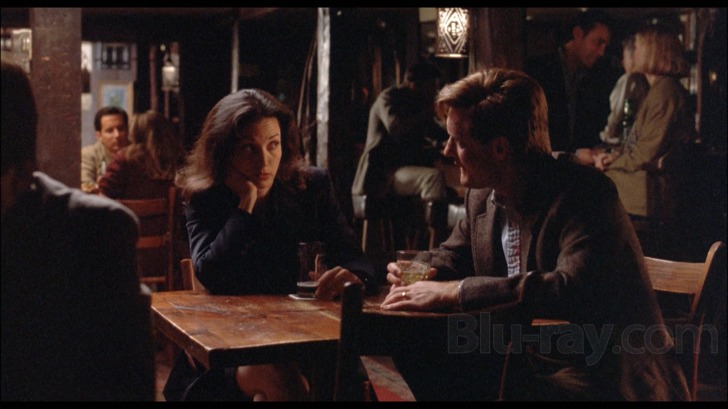
Malice's cinematographer, Gordon Willis, was one of several DPs of the Seventies to earn the nickname "The Prince of Darkness" because of his fondness for hiding detail. When he shot The Godfather, studio executives complained that no one could see Marlon Brando's eyes, to which Willis replied that this made the character more interesting. Years after shooting The Godfather, Part II, Willis conceded that he might have gone too far in darkening some of its scenes, adding: "I think Rembrandt went too far sometimes." Willis would no doubt have been amused by the current internet obsession with "crushed" blacks, because to him the notion that everything should always be visible was nonsense. Like a painter, he chose what the viewer should—and should not—see. Kino's 1080p, AVC-encoded Blu-ray has been taken from well-preserved source material (although I suspect it is not the original camera negative) and presents Willis' work with deep blacks and dark textures intact. Early scenes at the college, the Safian home and the hospital are brightly lit to establish a contrast with the increasingly dark and shadowy settings that predominate as the film develops, and the Blu-ray presentation presents this evolution effectively. Fine detail is effectively rendered with a natural grain pattern, a film-like texture and a color palette that gradually shades from flat to an almost noir-ish saturation. Some night scenes may strike viewers as excessively grainy, but anyone familiar with Willis' Godfather photography will know that he never shied away from heavy grain, if the light and shadow otherwise suited his taste. The only negative (and it's a minor criticism) is an occasional layer of video noise. Given the choice, however, I prefer minor amounts of noise to heavy-handed reduction. Kino has mastered Malice with an average bitrate of 23.96 Mbps, which is OK for a character-driven film without major action.
Malice Blu-ray Movie, Audio Quality 
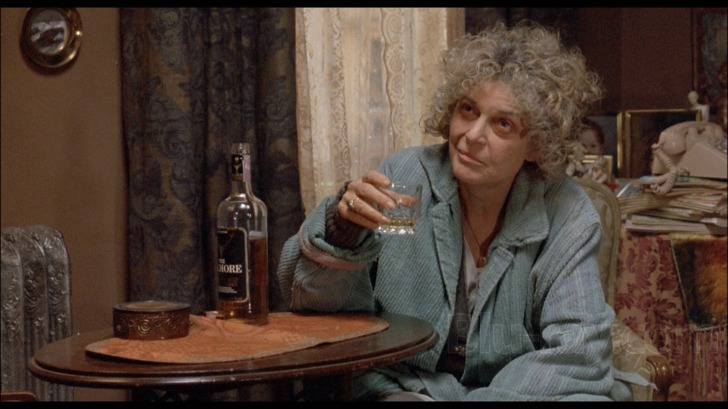
Malice's original Dolby SR track has been encoded in lossless DTS-HD MA 2.0, and it sounds very good. There's a nice example of precise sound editing in the sequence where Dr. Jed spends the night with Nurse Tanya in the bedroom above the Safians', and the scene cuts back and forth between his room, where the stereo is blasting, and their room below, where the sound is leaking from above. Other effects, such as the sounds of medical devices in the operating room, the bar where Jed and Andy meet for drinks, a torrential downpour at the ocean front and others that can't be described without spoilers are clearly rendered and, with a good surround decoder, spread out into the listening space. Dialogue is clear, and Jerry Goldsmith's effective score is precisely calibrated to the story's many twists and turns.
Malice Blu-ray Movie, Special Features and Extras 
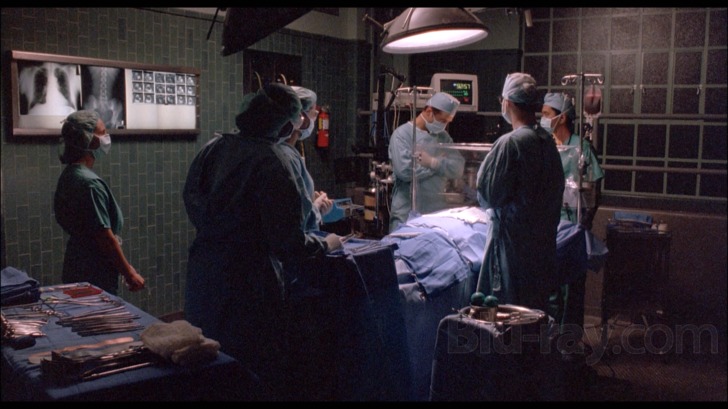
MGM released Malice on DVD in 2000 with only a trailer, which Kino has included here (1080p; 1.33:1; 1:57). Also included is a trailer (1080i; 1.85:1; 1:59) for The Onion Field, another Kino Studio Classics release.
Malice Blu-ray Movie, Overall Score and Recommendation 
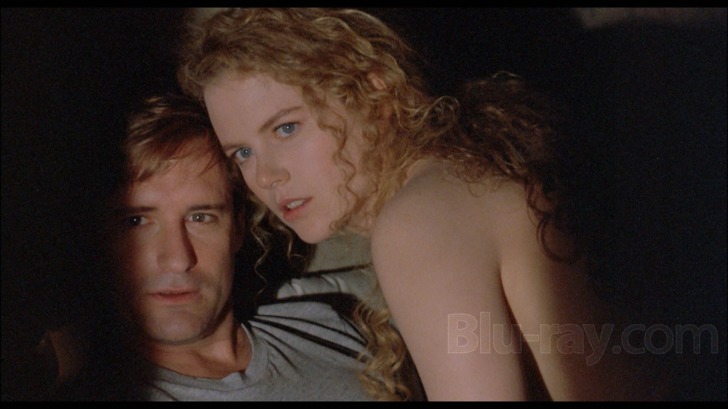
As I indicated at the outset, Malice is a sustained exercise in misdirection, and it really shouldn't work at all. That it does is a tribute to everyone involved, especially the lead cast, all of whom pitch their performances on a razor's edge of believability, and several of whom have to negotiate some tricky turns. Their performances are consistently interesting, and in Kubrick's famous dictum, interesting is better than real. Even without extras, Kino has done a nice job on the Blu-ray, which is recommended.
Similar titles
Similar titles you might also like

Dial M for Murder 3D
1954

China Moon
1994

I Confess
Warner Archive Collection
1953

Obsession
Indicator Series | Limited Edition
1949

Laura
Fox Studio Classics
1944

Vertigo 4K
1958

Mulholland Falls
1996

Hustle
1975

Fallen Angel
1945

Heaven's Prisoners
1996

A Kiss Before Dying
1956

The Big Sleep
Warner Archive Collection
1946

The Girl Hunters
Limited Edition of 2000
1963

Black Widow
Limited Edition to 3000
1987

Doomed to Die
1940

The Woman in the Window
1944

The Amazing Mr. X
1948

Body Double 4K
40th Anniversary
1984

Black Widow
Limited Edition to 3000
1954

Impact
Collector's Edition
1949
